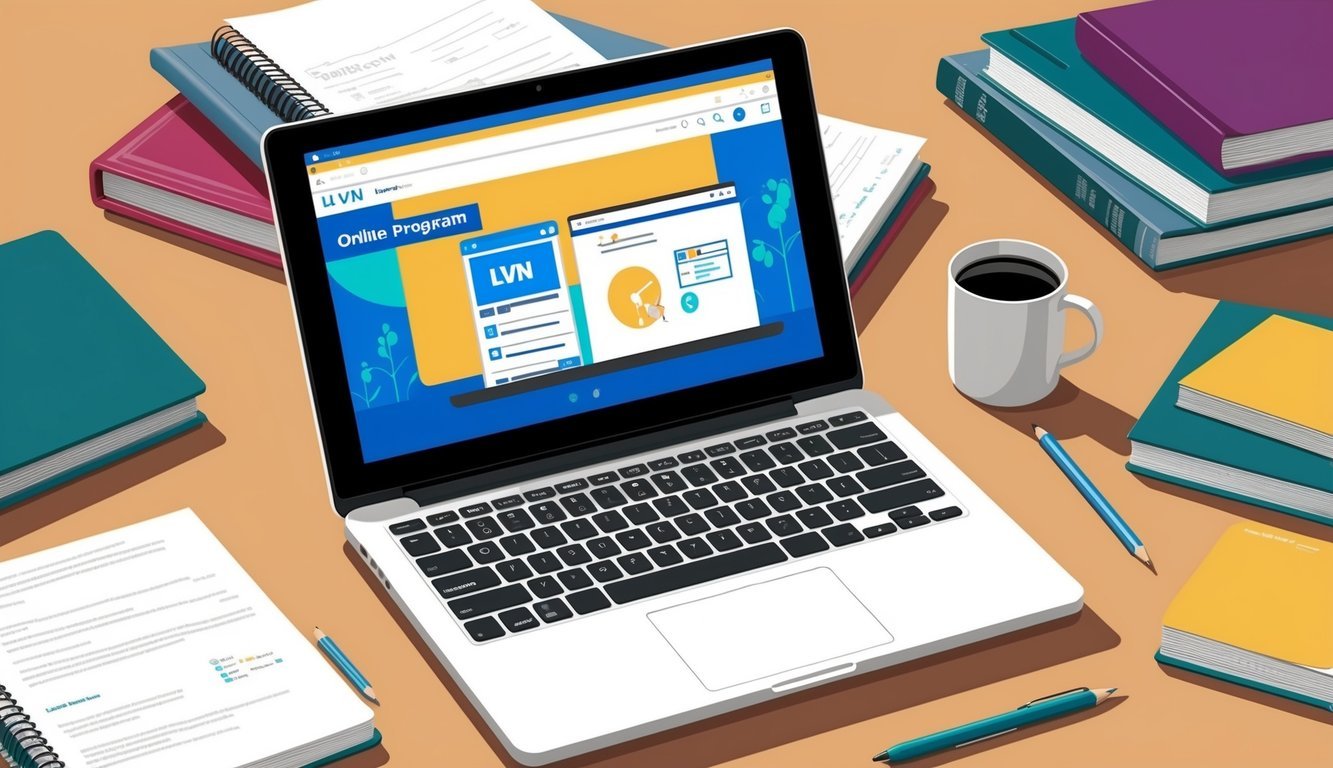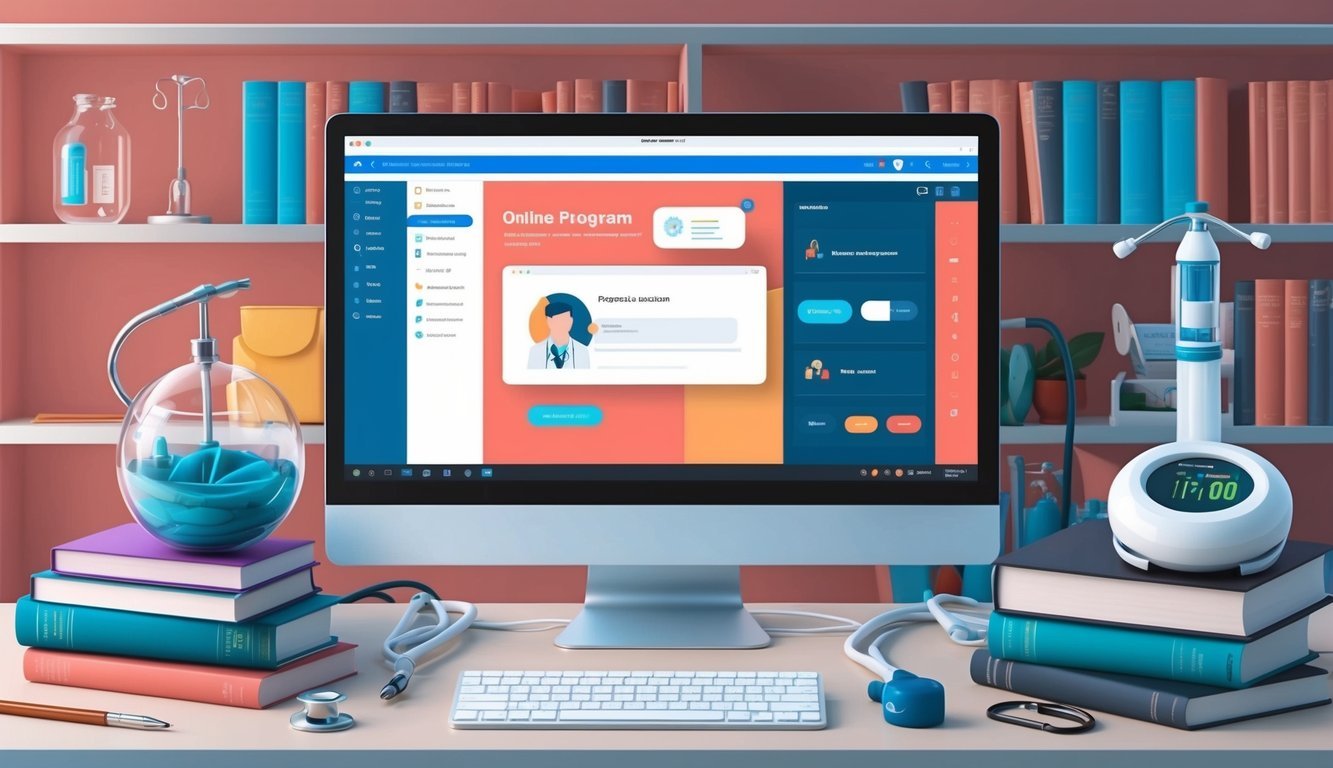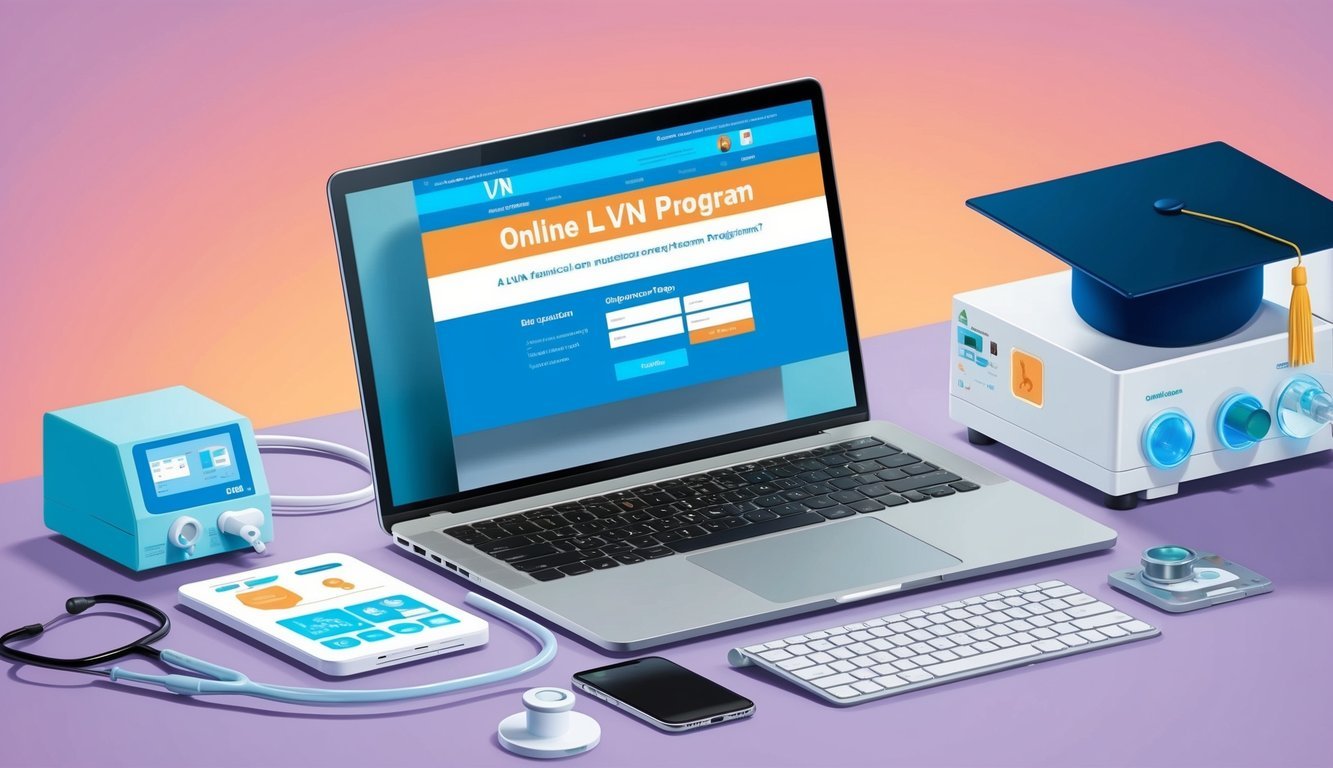Online LVN programs provide a flexible and accessible path to becoming a licensed vocational nurse.
Many aspiring nurses are looking for innovative ways to enter the field while balancing work and personal commitments. You can gain practical skills and theoretical knowledge from the comfort of your home, making it possible to pursue your career goals without sacrificing your current responsibilities.
By enrolling in an online LVN program, you will engage in a curriculum designed to cover essential nursing principles, ethics, and hands-on patient care through in-person clinical experiences.
This combination of online learning and practical training prepares you to succeed in a variety of healthcare settings.
Many accredited programs, such as those highlighted on EduMed.org, offer affordable tuition and numerous financial aid options to support your educational journey.
The path to becoming a licensed practical nurse (LPN) varies by state, but online LVN programs can streamline this process for you.
Programs typically take about a year to complete on a full-time basis, allowing you to start your nursing career sooner.
With the right resources and determination, you can position yourself for a rewarding career in nursing through these online opportunities.
Exploring LVN Online Programs
LVN online programs provide flexible learning options that cater to your needs while ensuring you receive a comprehensive nursing education.
These programs often blend distance learning with essential in-person clinical training, allowing you to balance your studies with personal commitments.
Online Learning and Distance Education
Online learning for LVN programs offers you the convenience of studying from home.
These programs often use platforms that facilitate interaction with instructors and peers through video lectures, discussion boards, and online assessments.
Most online LPN programs require a mix of theoretical coursework and practical experience.
You’ll study subjects like nursing theory, ethics, and pharmacology.
Engagement in hands-on training through clinical rotations is essential, as practical experience in real healthcare settings is crucial for your development.
Accredited Online LPN Programs
Accreditation is vital when selecting an online LPN program.
Programs with proper accreditation ensure that your education meets industry standards, which is critical for your future employment.
Many accredited programs are available, including options that can be completed in as little as six months.
Institutions like Pinellas Technical College offer affordable tuition rates, such as $3,942 for a five-month practical nursing course.
To find accredited programs, you can visit useful resources like EduMed.
When researching options, verify that the program is recognized by nursing education accreditation bodies to facilitate your eligibility for licensure after graduation.
Admission Requirements and Prerequisites
When considering an LVN online program, it’s essential to understand the specific admission requirements and prerequisites.
These criteria typically include educational background, standardized testing, and potential background checks.
General Education and Prerequisite Courses
Most LVN programs require you to have a high school diploma or a GED certificate.
This foundational education ensures you meet the basic skills needed for nursing coursework.
In addition, many programs stipulate the completion of prerequisite courses, which may include:
- Biology
- Chemistry
- Mathematics
- English
These courses should generally be completed with a minimum GPA of 3.0.
Check with your chosen program for specific requirements, as some may have different criteria.
A firm grasp of these subjects is crucial for success in nursing training.
Test of Essential Academic Skills (TEAS)
The Test of Essential Academic Skills (TEAS) is often a requirement for admission into LVN programs.
It assesses your knowledge in key areas such as reading, mathematics, science, and English.
Studying for the TEAS can significantly enhance your chances of success in the application process.
Each program may set a benchmark score, so it’s advisable to prepare thoroughly.
Scores enable programs to evaluate your academic readiness for nursing courses.
Additionally, be prepared for other potential requirements, such as a background check and a drug screening.
These are standard procedures to ensure the safety and integrity of the healthcare environment.
Curriculum and Coursework

The curriculum for LVN online programs integrates essential nursing theories with practical applications.
You will engage in a variety of courses designed to equip you with the necessary skills and knowledge to excel in healthcare.
Core Nursing Courses
Core nursing courses form the backbone of your practical nursing program.
You will study subjects such as:
- Nursing Theory: Understanding the principles that underlie nursing practices is crucial for your development.
- Anatomy and Physiology: This course provides insights into the human body’s systems, which is essential for effective patient care.
- Pharmacology: Learn about medications, their effects, and how to administer them safely.
- Patient Care Fundamentals: Focuses on basic nursing skills and patient interaction.
These courses are often supplemented with hands-on clinical experiences, allowing you to apply what you’ve learned in real-world settings.
Specialized Healthcare Subjects
In addition to core courses, specialized healthcare subjects delve deeper into particular areas of nursing.
These may include:
- Pediatric Nursing: Deals with the care of infants and children, addressing their unique health needs.
- Geriatric Nursing: Focuses on the aging population and the complexities of elderly care.
- Mental Health Nursing: Covers psychological assessments and therapeutic interventions.
Each subject enhances your knowledge and prepares you for specific nursing roles, broadening your career opportunities.
Programs may vary, so it’s important to review your school’s curriculum for specific offerings.
You can explore additional resources for program details and structure at sites like Nurse.org and EduMed.org.
Clinical Experience in LVN Programs

Clinical experience is a crucial component of LVN programs, ensuring you acquire effective nursing skills and hands-on training.
It not only enhances your understanding of patient care but also prepares you for real-world healthcare settings.
Hands-On Training Requirements
In LVN programs, hands-on training requirements are designed to provide you with practical experience in nursing.
Typically, you will engage in both classroom instruction and supervised clinical practice.
Programs may require you to complete between 500 to 1,000 clinical hours, depending on the school.
These hours generally include:
- Patient assessments
- Administering medications
- Basic nursing procedures
This training takes place in various healthcare settings, allowing you to apply theoretical knowledge in real-life situations.
Completing these requirements successfully is essential for qualifying for the NCLEX-PN exam.
Clinical Sites and Partnerships
Your LVN program will likely have partnerships with local healthcare facilities to facilitate clinical training.
These partnerships ensure you receive a diverse array of experiences, from hospitals to outpatient clinics.
Most programs help you secure placements in:
- Long-term care facilities
- Rehabilitation centers
- Community health organizations
Access to various clinical sites allows you to interact with diverse patient populations and refine your nursing skills.
Effective collaboration with these facilities enhances your learning experience, providing you with valuable insights into patient care practices.
For more information on clinical experience requirements, see resources like Nurse.org and EduMed.org.
Licensing and Examination

To become a Licensed Vocational Nurse (LVN), you need to complete specific licensing and examination requirements.
Understanding the steps involved in the NCLEX-PN exam and various state board requirements is crucial for your success.
Preparing for the NCLEX-PN Exam
The NCLEX-PN exam is essential for obtaining your nursing license.
It assesses your knowledge and skills in practical nursing.
To prepare effectively, consider the following steps:
- Review Content: Focus on major nursing concepts, patient care, and safety. Resources like test prep courses can help.
- Practice Questions: Utilize NCLEX-style questions to simulate the exam environment.
- Study Groups: Joining a group can enhance your understanding through discussion.
- Time Management: Develop a study schedule leading up to the exam date.
The NCLEX-PN pass rate reflects how well the nursing programs prepare students.
Maintaining high pass rates is important, and many reputable programs share their statistics to reassure prospective students.
State Board of Nursing Requirements
Each state has unique requirements set by the board of nursing.
Be sure to check the specific criteria for your state.
Common requirements typically include:
- Application: Submit your application for licensure to your state board.
- Official Transcripts: Provide proof of graduation from an accredited LPN or practical nursing diploma program.
- Background Check: Complete a criminal background check as mandated by state regulations.
- Exam Fees: Pay any applicable fees for processing your application and the NCLEX-PN exam.
Understanding each state board’s requirements ensures you’re prepared and can expedite the licensure process.
To learn more about your specific state’s regulations, visit your local board of nursing.
Career Opportunities and Outlook

As a Licensed Vocational Nurse (LVN), you have a variety of career paths and opportunities for advancement within the healthcare field.
Understanding employment statistics and the potential for transitioning into higher roles can help you make informed decisions about your career.
Advancing from LPN to RN
Transitioning from a Licensed Practical Nurse (LPN) to a Registered Nurse (RN) is a common goal for many LVNs.
This advancement typically involves enrolling in an Associate Degree in Nursing (ADN) or a Bachelor of Science in Nursing (BSN) program.
Key Points:
- Timeframe: Many LPN-to-RN programs take 1-2 years to complete.
- Benefits: RNs usually enjoy higher salaries and more comprehensive job responsibilities.
- Growth Potential: The U.S. Bureau of Labor Statistics projects a 6% growth for RNs from 2021 to 2031, indicating strong demand.
Employment Statistics and Projections
The U.S. Bureau of Labor Statistics forecasts a 9% growth in LVN employment opportunities through 2030.
An aging population and increased healthcare needs drive this growth.
Current Statistics:
- Median Annual Wage: As of May 2023, LVNs earned a median annual wage of $59,730.
- Common Employers: Opportunities are available in hospitals, nursing homes, and outpatient clinics.
- Employment Rate: Many LVNs report high job placement rates upon graduation, enhancing job security.
These statistics indicate that pursuing a career as an LVN offers not only immediate job opportunities but also substantial potential for growth and advancement in the healthcare sector.
For more detailed information on how to become an LVN, visit BLS: Licensed Practical and Licensed Vocational Nurses.

